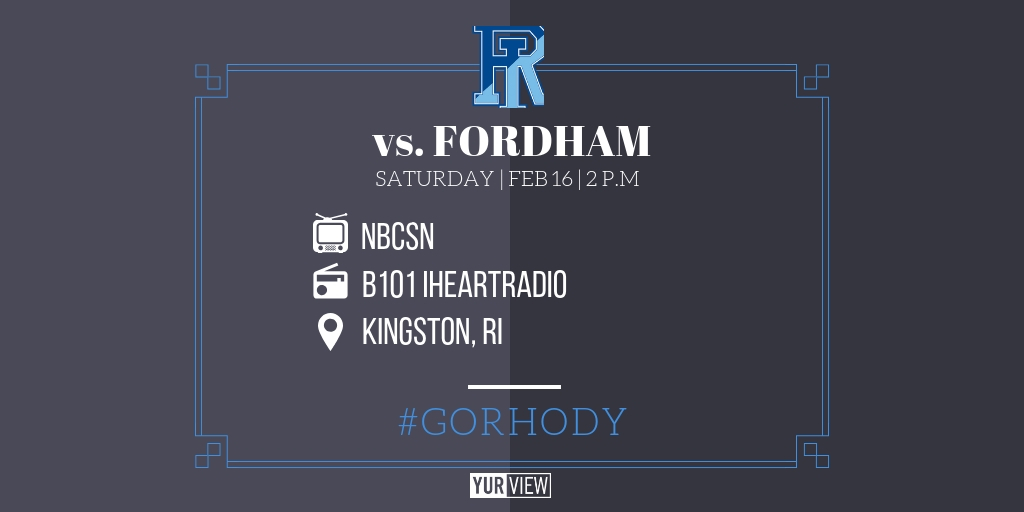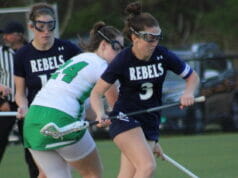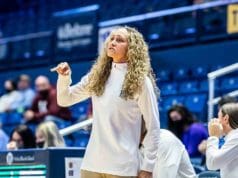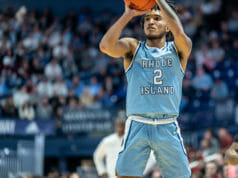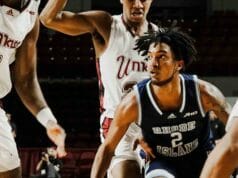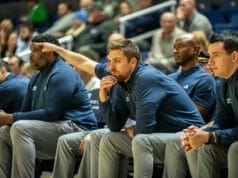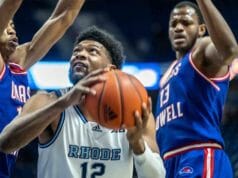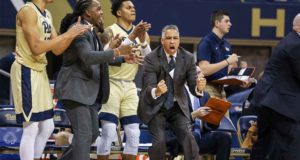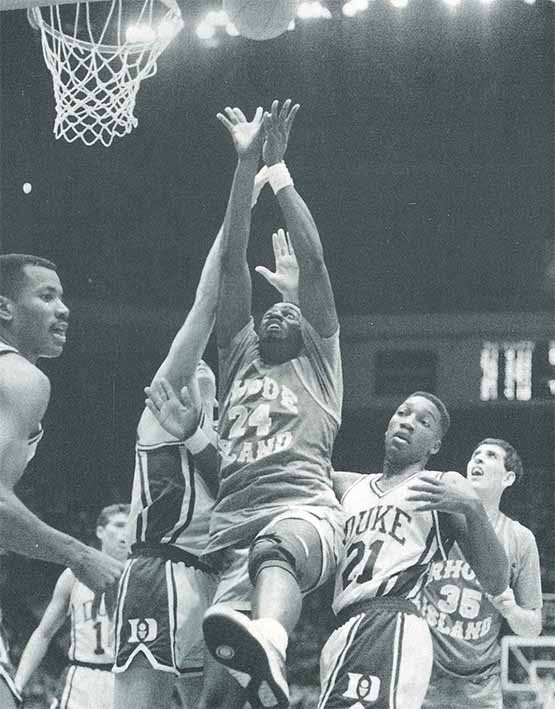
Kenny Green enforced the paint for successful Rhode Island Rams teams from 1985-90. The 6-8 forward was a dominating presence, finishing 11th in program history in scoring (1,724), fourth in rebounding (996), and amassing a program record 328 blocked shots — a tally that withstood a furious challenge from Hassan Martin (321) in recent years.
Altogether, Green had five games with eight or more blocked shots and led the nation in 1989-90 at 4.8 swats per game, edging out a fella you may have heard of… Dikembe Mutombo.
Now thirty years later, after a successful career overseas, Green is back around the program he represents. He keeps a low profile, but can be spotted in the Ryan Center with regularity watching his alma mater.
During this bye week for Rhode Island (no game Wednesday), I caught up with Green for a lengthy discussion about basketball, leadership and what he sees out of this year’s team to date. Here’s what the thoughtful Green had to say:
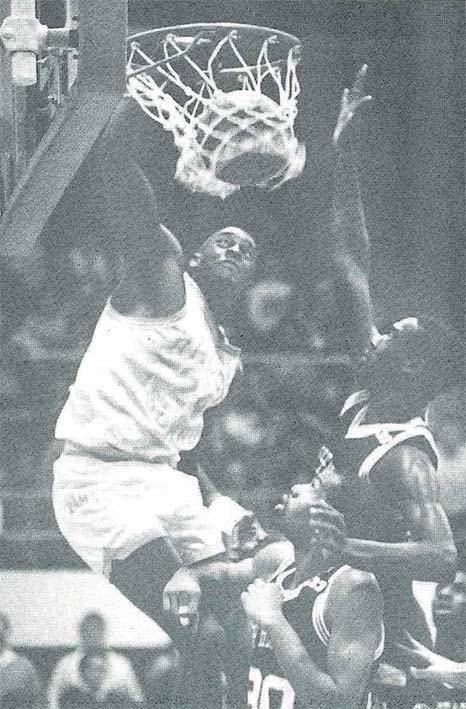
Chris DiSano: Thanks for taking some time to talk. Can you bring fans up to speed on what you’ve been up to these days?
Kenny Green: Basically, after leaving school in 1990 I went directly overseas. I spent my whole career over there, home in the summers for a month or so and then back overseas between Spain, Turkey and the Middle East.
Once I wrapped up playing over there I started coaching some. After a while, I became really tired of being away from my family, the States, and decided it was time for me to come back home.
Eventually, I made my way back home and – because I hadn’t finished my degree – the first thing I set in motion was to finish that up. My middle daughter, a sophomore at Indiana Tech, laid down a little bet that she would finish before I finished. I told her ‘that just can’t happen,’ [laughing]. So I’m focusing on that right now, I have one class left, and God-willing, come May, I’ll be done. I’m gonna beat her… [laughs].
CD: Has it been enjoyable for you getting back here and being able to see some Rams’ games up close?
KG: You know, I really enjoy it. The game is a lot different from when I played, but I enjoy it.
Earlier tonight I ran into Cyril Langevine. We’ve had a little thing going that he keeps saying ‘I’m going to tie you with averaging a double-double for the season’ (Green is the only Ram to ever average a double-double, averaging 17.5ppg, 10.9rpg in being named A-10 POY in 1990), ‘I’m going to pass you in rebounding…’ It’s been a good back and forth.
I’ve told him it’s a great thing because records are made to be broken, and breaking my records means you’re working hard. So to see that happen would be nothing but a pleasure. So it’s been fun being around.
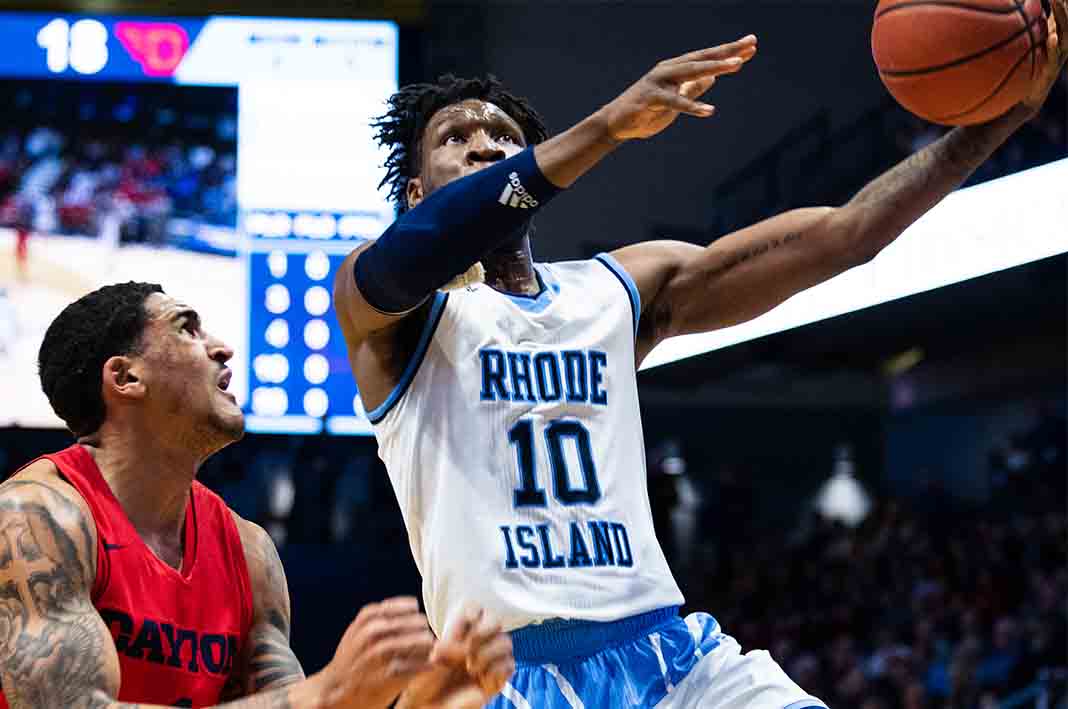
CD: Let’s turn it back from a moment. The 1987-88 Tom Penders-led team with you, John Evans, Mergin Sina, Bonzie Colson, Josh Oppenheimer, Steve Lane and others was a great group… but the two guards, Carlton “Silk” Owens and Tommy Garrick… what made each of those guys remarkable to you from a teammate’s perspective?
KG: Their leadership. This is another thing I chatted to Cyril about when I ran into him. They were leaders on the floor and off the floor. But really on the floor.
What I mean is they were verbal leaders. And I feel that it’s one area this current Ram team needs someone to seize. That’s something that didn’t have to come from the coaching staff but had to be internal, player-wise.
This current team has players that are demure and laid back who don’t show a ton of emotion. From my standpoint and what I’ve seen, that’s a great opportunity for someone to step up and take that verbal role. It would benefit everyone.
I remember one game we were playing down at George Washington and not playing well early on: me, Bonzie and John. In the middle of the game Tommy and Silk literally smacked Bonzie and me in the head and told us ‘Hey, it’s time to go… work hard.’
Those guys were just special. It’s rare even today to see two guards on one team that in any given night can give another team 30 points. And, either of those guys was extremely happy for the other one if that happened. So, on our team, there was no ego and that started with Silk and Tommy, because we saw how they were with each other as the main guys. There was no ego, they were genuinely happy for each other, our team, and other players who did well.
And that carried on among the rest of us.
CD: You alluded to this earlier, but let’s dig into it. How has the game changed since your days?
KG: It’s not as tough, pivot-wise.
You have so many pivots who want to step out and shoot threes. You don’t see too many guys – especially what I’ve seen so far in the A-10 – who are true post players, who can play really well with their back to the basket — or are just punishing big men.
I wasn’t the biggest guy. That might have been my ultimate downfall in that I wasn’t as heavy, wasn’t as strong, wasn’t as tall. And in today’s game, everybody wants to be able to go coast-to-coast and that’s taken away a lot from the game and, of course, transcended to the NBA level. Everyone wants to step out and shoot the three-pointer.
That’s good if you can shoot it. But if you can’t, concentrate on something that you’re good at and focus on building that part of your game.
CD: Over the past four years in this recent run where Rhode Island won 91 games, with David Cox an important part of that staff, what impressed you about those teams? I know you didn’t see those squads live all four years, but I believe you did last year, correct?
KG: Yes, last year I got to see that team as they made their run through the A-10. They were a great team. They got down and dirty and were led by seniors.
A senior understands this is his last go-around. If he’s looking to play at the next level, he’s got to put everything out there night in and night out. I don’t think this team can fully appreciate that yet because of its youth.
When I was a freshman, we were told ‘You’ve got five games to be a freshman.’ After that, it’s still basketball. Everybody that’s here [at the D-I level] is here because they can play. And I believe these guys can play.
CD: What do you see as the primary challenge or challenges facing the current Rams?
KG: I want to see cohesiveness develop. These guys can play as I said, they just haven’t learned how to put it together on a consistent basis yet.
Nobody knows what goes on in the locker room at halftime, nobody knows what goes on in meetings, but to be able to come out on the floor and put your foot in somebody’s behind who’s not playing well and motivate them… again, as we talked about before, I’d love to see more of that.
CD: How about mindset? What’s the most important part of generating and sustaining a competitive mindset?
KG: Your mindset has to be to look out for your brother. If your brother is having a hard time, find a way to make it easier for him. Serve your teammates.
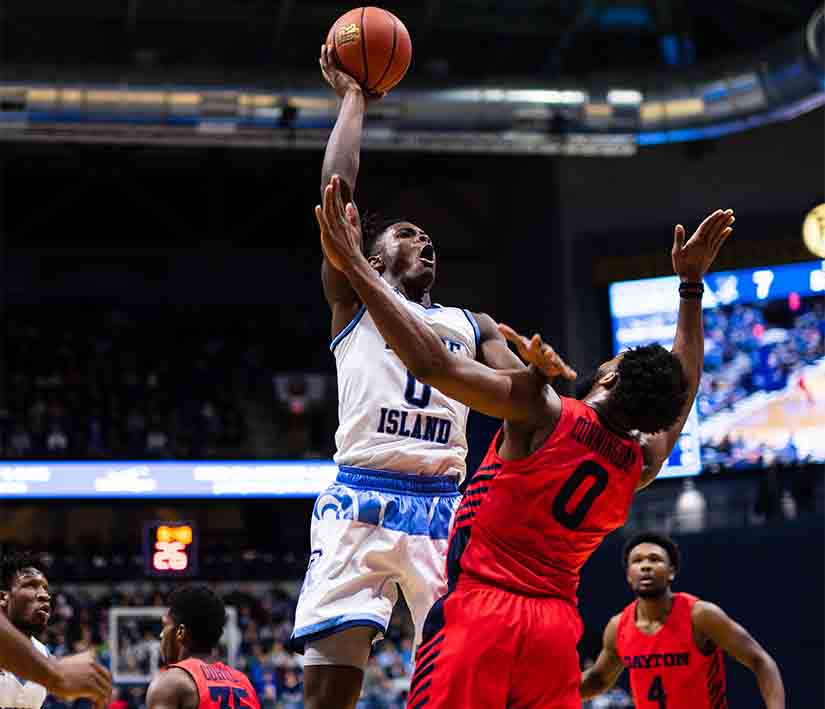
CD: Let’s look at opportunity for a couple of young forwards, Dana Tate and Jermaine Harris. Harris, in particular, from a physical perspective, is probably closer to the way you were when you arrived.
What do you see as a former forward from these guys and how can they elevate their games and grow?
KG: Let’s take Jermaine first. He’s a better athlete than I was and a better shooter than I was. The only area I think Jermaine needs to pop for him is understanding the game. Everything is going so fast for him. He’s gotta learn to slow the game down in his head, but we’ve all seen glimpses. He’s got good lateral movement, can shoot it but will shoot it with more confidence. I think guys are concerned with making mistakes right now.
As far as Dana is concerned, he’s a very good shooter. But in this system and on this team, he’s going to be playing on the interior a good deal too. I think he can develop his interior game. He may not be able to jump over somebody, but there are ways of scoring in the post that he can grasp as he develops to help him be effective there too.
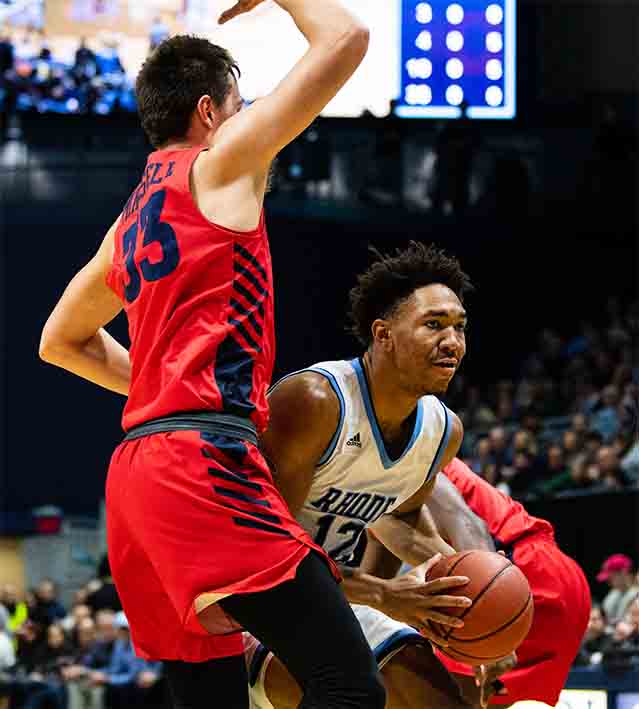
CD: How does this team find itself, turn the corner, and build confidence after enduring this rough stretch (losing four of five)?
KG: Have a short memory. Every game is a new day. That’s something Coach Penders instilled in us. ‘Okay, you lost. There’s nothing you can do about it. But there’s a game next week, so the mistakes we made today aren’t the mistakes we’ll make tomorrow.’
But I recognize it’s different today. We didn’t have Twitter, Facebook and Instagram. So if we got criticism from the fans, or from people outside the family, it was to our face.
What these kids have now is an overload of information and a lot of it that they need to block out. These kids have to put in in their heads that ‘we’re human, it’s basketball, and we’re going to make mistakes. But we’re never going to allow our effort to drop off.’
Teams will be better than you and players will be better than you, but commit to having nobody ever outwork you.
CD: Thanks KG, see you at next week’s game?
KG: Yessir.



